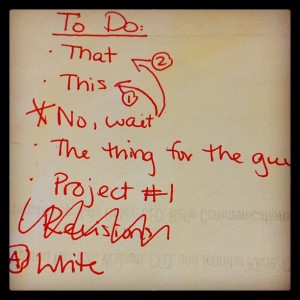 We all want to be more productive in our daily lives — accomplishing more in less time, completing major projects without getting overwhelmed by the size or scope, and simply being more efficient.
We all want to be more productive in our daily lives — accomplishing more in less time, completing major projects without getting overwhelmed by the size or scope, and simply being more efficient.
Jason Womack, productivity trainer and author of Your Best Just Got Better: Work Smarter, Think Bigger, Make More, examines three factors that can make or break your productivity in an article for Entrepreneur.
Three Ways to Be More Productive
What are Your Routines?
Womack encourages people to examine their daily routines closely, and run through an assessment of how they manage their to-do lists.
“You know you’ve normalized your workflow if, when you do something a different way, or chose not to do it altogether, it feels as if something is missing or wrong.”
Routines are important, but Womack notes you shouldn’t become so grounded to your routine that disruptions to those routines severely affect your productivity.
Asking yourself if there’s a better way to complete a task can uncover better processes that increase efficiency.
Where do You Work?
The environment in which we work can have a considerable impact on our overall productivity, says Womack.
As you begin an assessment of your physical working space, Womack suggests you consider the following questions:
- How often do you spend time looking for tools to do your job?
- How comfortable are you using them?
- Are you inspired by your surroundings to get something done?
“The purpose of asking yourself these questions is to help you think about how context influences you in a positive or negative way. When you want to get something important done, change your context.”
Context is important to different kinds of work that you encounter in any given day. Problem-solving, strategic planning, and responding to customer inquiries or complaints involve different skills and context to accomplish quickly and effectively.
By experimenting with context, Womack suggests that you’ll get a better idea of how physical conditions impact your thinking and overall productivity.
Who do You Spend the Most Time With?
Your relationship with coworkers and those in your personal and professional networks can have significant influences over your productivity, mindset, and behavior.
Seek out mentors and coaches who align closely with your goals and actively encourage your personal and professional development, and avoid those people whose work habits don’t mesh with yours.
Womack suggests auditing your personal and professional relationships regularly, “ranking them by how supportive they are towards your productivity.”
Honestly assessing how you work best will make it easier to identify new and improved ways of doing more.
What tips do you have to be more productive?
